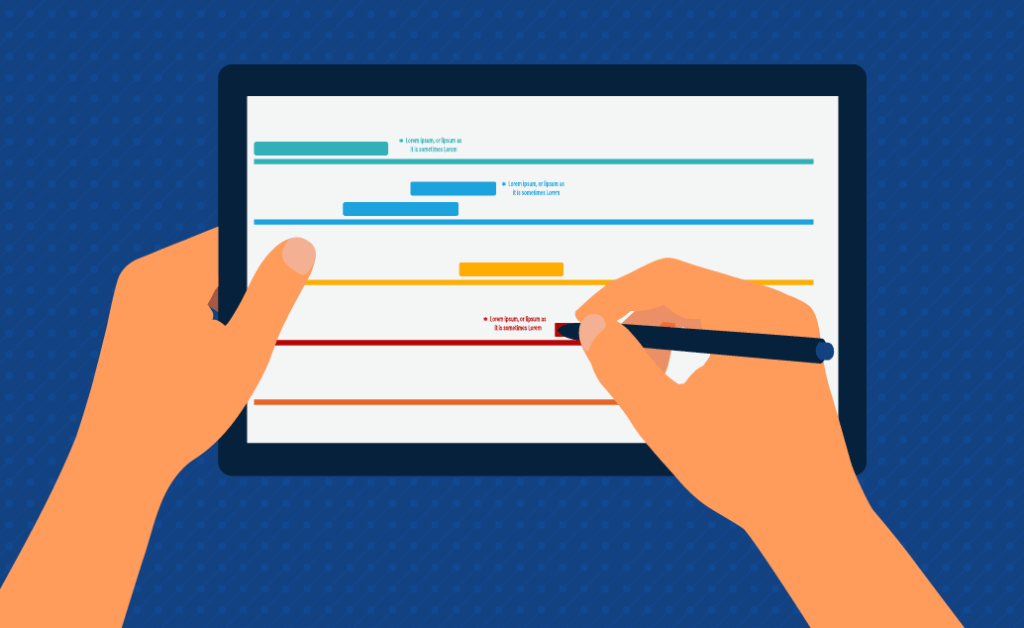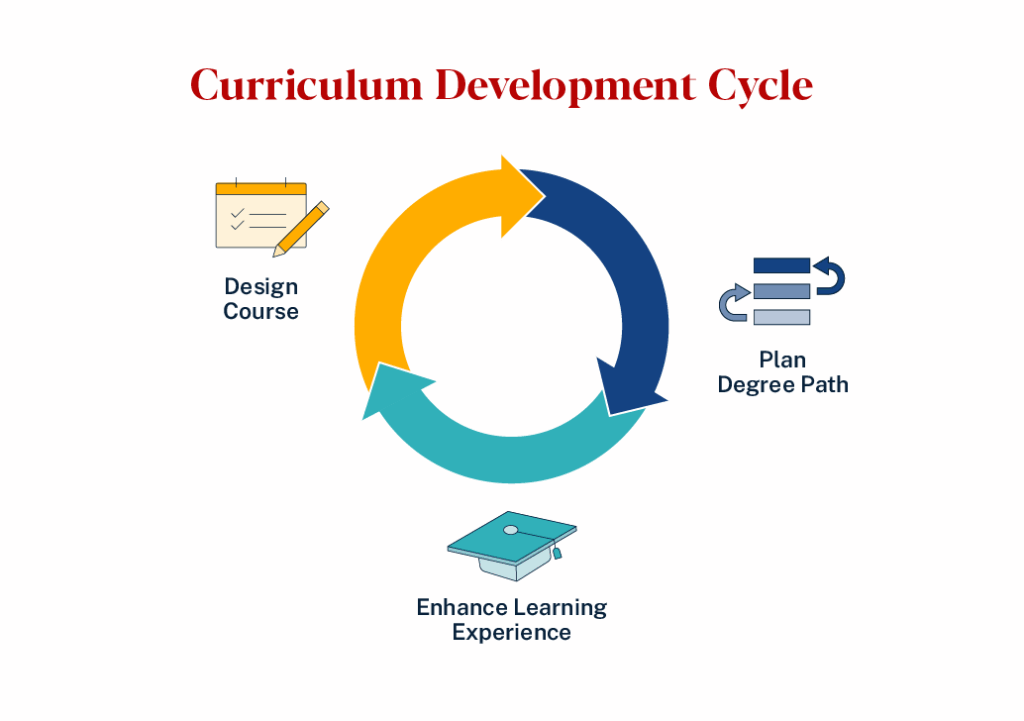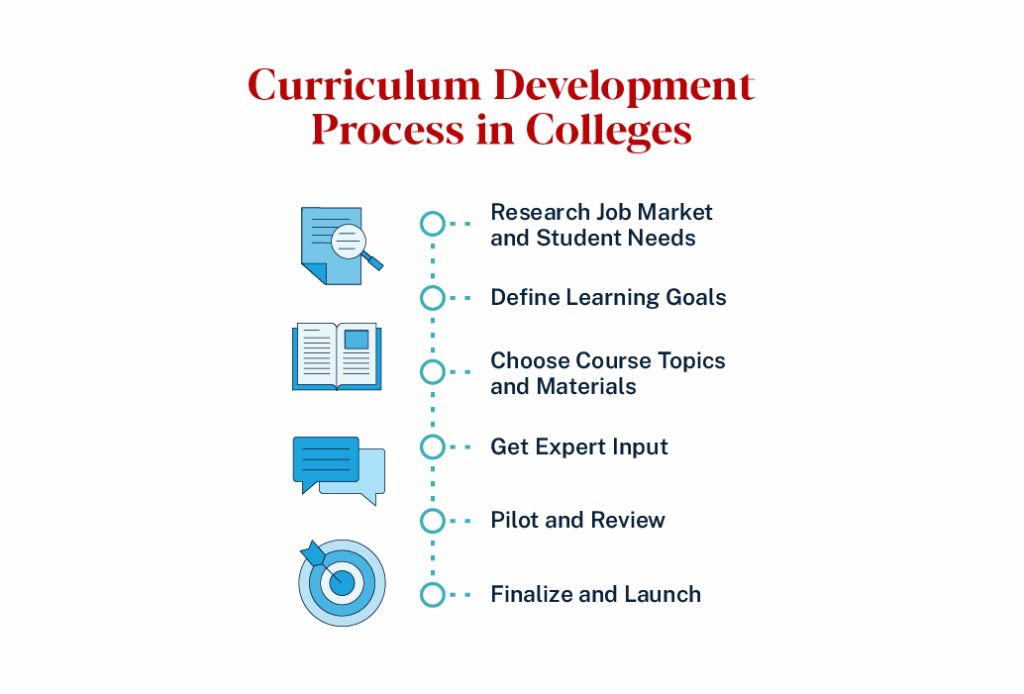
Why Curriculum Development Matters to You
What Is Curriculum Development in Higher Education?
Curriculum development is the strategic process colleges and universities use to design courses, academic programs and learning experiences. It’s the blueprint guiding what you learn, when you learn it and how each element connects to prepare you for your goals.
Think of it as the master plan behind your education. Every textbook, assignment and project is intentionally chosen to build a cohesive learning journey from where you are now to where you aim to be.
This process draws on insights from educational research, industry demands and student feedback to ensure programs are intellectually rigorous and relevant. Whether pursuing a professional certificate or an advanced degree, curriculum development shapes every step of your academic path.

Why You Should Care About Curriculum Development
Curriculum development directly affects your student experience. Here’s how a well-developed curriculum benefits you:
- Better classes: Strong design leads to well-organized, engaging courses where assignments and projects are connected and purposeful, not busywork.
- Career-aligned skills: Developers work with industry experts to ensure you learn what employers want–communication, data analysis and technical skills.
- Clearer learning paths: Thoughtful curriculum creates smarter course sequences and clarity about how each class fits your goals.
- Current, adaptable content: As industries evolve, so should education. Your learning addresses current workplace demands while developing critical thinking and adaptability for future careers.
When schools take curriculum development seriously, your education transforms from a series of courses into a strategic investment in success.
The Curriculum Development Process
Step-by-Step: How Colleges Develop a Curriculum
Here’s a behind-the-scenes look at how programs are designed:
- Research market needs.
- Development begins with environmental scans analyzing labor market trends, employer needs, accreditation requirements and successful practices. Student, faculty and alumni input ensures programs align with real-world opportunities.
- Develop a learner profile.
- Every student is different. Curriculum developers use learner analysis to understand students’ backgrounds, strengths, needs and aspirations.
- Define learning objectives.
- With research and student needs in mind, developers define clear and measurable learning objectives. These are the specific things you should know or be able to do by the end of the course. They reflect institutional values, program promises and employer expectations.
- Design backwards.
- Starting with the end in mind, developers work backward to design assessments, activities and materials. They create learning pathways addressing:
- Which topics to cover
- What assignments help you practice skills
- Which resources, technology and activities make learning engaging
- How to measure progress
- Starting with the end in mind, developers work backward to design assessments, activities and materials. They create learning pathways addressing:
- Apply learning science.
- Using cognitive science principles, developers:
- Sequence content from simple to complex (scaffolding)
- Manage cognitive load by avoiding information overload
- Integrate active learning through discussions, multimedia and projects
- Balance theory with application
- Using cognitive science principles, developers:
- Collaborate across disciplines.
- Faculty, instructional designers, librarians, tech specialists and industry professionals work together. Subject matter experts ensure accuracy and relevance.
- Pilot and refine.
- Teams pilot new courses with small student groups, collect feedback, assess outcomes and refine designs before full roll-out. This quality assurance step helps ensure the final version is as strong as possible.
- Launch and monitor.
- After careful planning and testing, courses go live with systems in place for ongoing evaluation and improvement. From research to launch, every step focuses on helping you succeed academically and grow professionally.

Who Builds Your Curriculum? Meet the Curriculum Development Team
ACE courses aren’t created by just one person. It takes a team of experts:
- Academic chairs: These leaders oversee programs, ensuring courses meet standards and prepare you for today’s job market.
- Faculty members: Academic professionals who teach also help design what you learn. They use subject knowledge and classroom experience to shape lessons and assignments.
- Subject matter experts: Field professionals verify courses teach skills employers want, keeping education practical and current.
- Curriculum developers: The architects of your learning experience design and review course materials, ensuring everything aligns with educational standards and industry requirements.
- Instructional designers: These team members build courses on the online platform, creating accessible, visually engaging and easy-to-navigate materials for a seamless online learning experience.
This collaborative team enhances teaching and improves learning outcomes, guaranteeing quality education that leads to meaningful learning.
What Makes Curriculum Strong?
A strong curriculum goes beyond a list of classes. Here’s what makes it work for you:
- Learning outcomes that matter. You know exactly what you’ll learn and why it’s important.
- Classes that build on each other. Courses are organized so that each prepares you for the next.
- Theory meets practice. You learn concepts through real-world projects and activities.
- Meaningful assessment. Evaluation shows what you know and can do, not just test-taking ability.
From Development to Delivery
At American College of Education (ACE), we use Instructure’s Learning Management System (LMS) Canvas to deliver high-quality content, preparing you for success.
Our master course model ensures consistent education for every student. The curriculum development and production team creates a comprehensive course template that serves as the foundation for all sections. Faculty facilitate learning experiences within this framework, using expertise to guide discussions and support progress. Students then receive a rigorous, research-based curriculum with personalized attention.
Your learning experiences at ACE include:
- Dynamic video content
- Scholarly readings and professional resources
- Engaging discussions in Harmonize
- Assignments for real-world application
Every component cultivates critical thinking, problem-solving and creative solutions that employers value. This approach ensures you graduate with skills and confidence to excel in your chosen field.
Continuous Improvement: How Schools Ensure It Works
After the course launch, the work isn’t finished. Academic leaders use ongoing feedback and data to track curriculum implementation:
- Student feedback: Course evaluations and comments help identify what works and what could be better.
- Career alignment: Programs are checked against job market needs.
- Accreditation standards: Courses undergo regular assessment to meet the high benchmarks set by accrediting bodies, ensuring your degree holds value.
- Program review: Teams examine student success data and outcomes for improvement areas. ACE maintains regular review cycles for every program.
This continuous improvement loop means your learning experience gets better each year.
ACE’s Unique Approach to Curriculum Development and Production
Unlike colleges that simply upload classroom materials online, ACE creates curriculum specifically for digital learning. Every course maximizes digital tools while fitting your busy life.
How ACE Does It Differently
ACE is committed to making high-quality education accessible, affordable and flexible for working adults. Our curriculum focuses on:
- Engagement: Interactive discussions, multimedia content and real-world projects to help apply learning.
- Consistency and quality: Our master course model ensures every student receives the same high-quality, evidence-based curriculum regardless of when or where they study.
- Flexibility: Courses are structured for your schedule, balancing school, work and life.
- Affordability: Innovation and efficiency keep tuition low without sacrificing quality.
Measuring Our Impact
At ACE don’t just talk about results, we track them:
- Student satisfaction: 88% of students are satisfied with their overall experience.
- Learning application: 96% of graduates apply what they learned throughout programs.
- Professional impact: 98% of graduates report strengthened professional skills.
- Employer confidence: 96% of employers are satisfied with graduate performance.
- Strong outcomes: ACE maintains an 85% retention rate and 85% graduation rate, exceeding national online college averages.
ACE’s approach is different by design. We build curriculum with your success in mind. Every course, assignment and learning experience is intentionally designed to help you grow, achieve your goals and make a real impact in your career and community. Our commitment to quality, innovation and accessibility means you don’t have to choose between flexibility and excellence – you get both.

